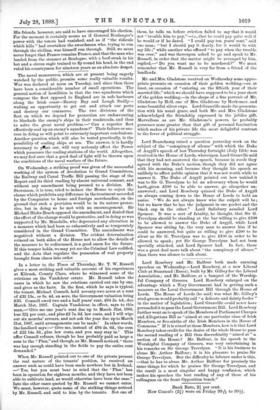Lord Beauchamp raised a question yesterday week on the subject
of the "conspiracy of silence" with which the Duke of Argyll's speech of last Thursday fortnight (July 12th) was received in the House of Lords, whereupon Lord Granville said that they had not answered the speech, because in words they agreed with the Duke's motion, though they did not agree with his meaning, and because they thought his speech so unlikely to affect public opinion that it was not worth while to answer it. The Duke of Argyll pointed out how unkind it was to Sir G. Trevelyan to let an adversary whom he would. hav14give,n £100 to be able to answer, go altogether un- answered; and Lord Rosebery quizzed the Duke of Argyll on always coming down to the House of Lords to hold an assize. " We do not always know who the culprit will be; but we know that he has the judgment in one pocket and the black cap in the other." Lord Salisbury assailed Lord Spencer. It was a sort of fatality, he thought, that Sir G. Trevelyan should be standing at the bar willing to give £100 to be allowed to answer the Duke of Argyll, while Lord Spencer was sitting by, the very man to answer him if he could be answered, but quite as willing to give £200 to be silent as Sir G. Trevelyan was to give £100 in order to be allowed to speak ; yet Sir George Trevelyan had not been specially attacked, and Lord Spencer had. In fact, there was a great deal more talk about " the conspiracy of silence" than there was silence to talk about.


































 Previous page
Previous page